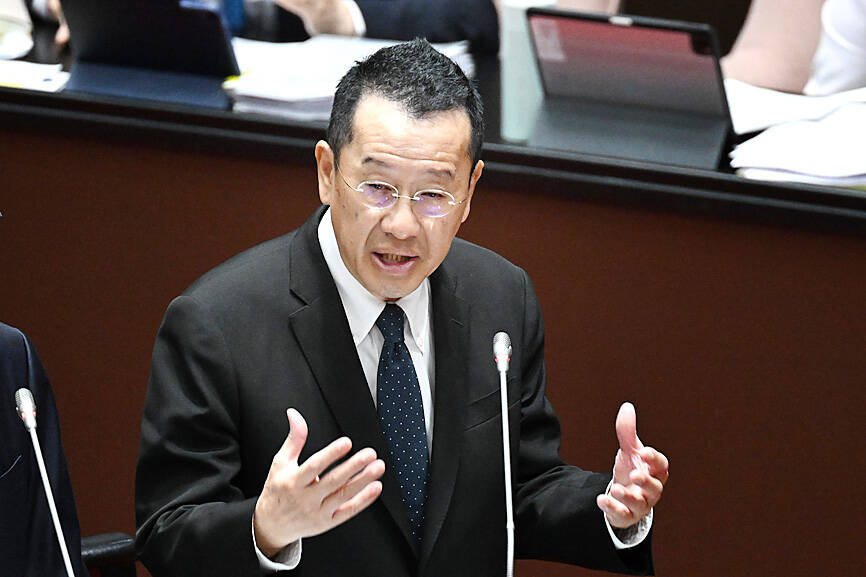Minister of National Defense Wellington Koo (顧立雄) yesterday said that a warning by the US’ top commander for the Indo-Pacific region about significantly increased Chinese military aggression toward Taiwan underscores that peace in the Indo-Pacific region is a “core interest” of the US.
Before the start of a legislative plenary session, reporters asked Koo about remarks from US Indo-Pacific Commander Admiral Samuel Paparo that China’s aggressive military actions toward Taiwan have increased 300 percent over the past year.
Closing the Taiwan Strait, one of the world’s major trading channels, could be more devastating than for the world than the Great Depression in the 1930s, Paparo on Thursday last week told the US Senate Committee on Armed Services when asked why Americans should care about protecting Taiwan, US Naval Institute News reported.

Photo: Chen Yi-kuan, Taipei Times
A blockade in the waterway would expose the US’ dependence on Taiwan for semiconductor production, which is essential to modernizing and growing the domestic economy, the report quoted Paparo as saying.
War in the Indo-Pacific region could cause “a 25 percent reduction in GDP in Asia, an effect of 10 to 12 percent GDP reduction in the United States of America, unemployment spiking at 7 to 10 percent” above normal levels, “and 500,000 excess deaths of despair,” he said.
Even a successful US intervention “would halve that impact, so still a grave result” and “a lot of human misery,” he added.
Koo said that Paparo’s remarks were proof that stability and prosperity in the world hinge on stability and prosperity in the Indo-Pacific region.
It also showed that maintaining the “status quo” in the Taiwan Strait is practically a consensus among countries around the world and something that requires an active effort to maintain.
Koo referenced a leaked Pentagon internal memo as evidence of the US’ commitment to deterring a Chinese annexation of Taiwan.
The memo, leaked during US Secretary of Defense Pete Hegseth’s tour of Asia last month, reportedly directed the prioritization of deterring China’s capture of Taiwan while scaling back its support for Ukraine amid Russia’s ongoing invasion.
China is the Pentagon’s “sole pacing threat,” and denial of a “Chinese fait accompli seizure” of Taiwan while simultaneously defending the US homeland is its “sole pacing scenario,” the memo reportedly said.

Chinese spouse and influencer Guan Guan’s (關關) residency permit has been revoked for repeatedly posting pro-China videos that threaten national security, the National Immigration Agency confirmed today. Guan Guan has said many controversial statements in her videos posted to Douyin (抖音), including “the red flag will soon be painted all over Taiwan” and “Taiwan is an inseparable part of China,” and expressing hope for expedited reunification. The agency last year received multiple reports alleging that Guan Guan had advocated for armed reunification. After verifying the reports, the agency last month issued a notice requiring her to appear and explain her actions. Guan

GIVE AND TAKE: Blood demand continues to rise each year, while fewer young donors are available due to the nation’s falling birthrate, a doctor said Blood donors can redeem points earned from donations to obtain limited edition Formosan black bear travel mugs, the Kaohsiung Blood Center said yesterday, as it announced a goal of stocking 20,000 units of blood prior to the Lunar New Year. The last month of the lunar year is National Blood Donation Month, when local centers seek to stockpile blood for use during the Lunar New Year holiday. The blood demand in southern Taiwan — including Tainan and Kaohsiung, as well as Chiayi, Pingtung, Penghu and Taitung counties — is about 2,000 units per day, the center said. The donation campaign aims to boost

The Kaohsiung Tourism Bureau audited six hotels in an effort to prevent price gouging ahead of Korean band BTS’ concert tour in the city scheduled for Nov. 19, 21 and 22 this year. The bureau on Friday said that the audits — conducted in response to allegations of unfair pricing posted on social media — found no wrongdoing. These establishments included the local branches of Chateau de Chine, Hotel Nikko, My Humble House, and Grand Hai Lai, it said, adding that the Consumer Protection Commission would have penalized price gougers had the accusations been substantiated. The bureau said the Tourism Development Act

BACK TO WINTER: A strong continental cold air mass would move south on Tuesday next week, bringing colder temperatures to northern and central Taiwan A tropical depression east of the Philippines could soon be upgraded to be the first tropical storm of this year, the Central Weather Administration (CWA) said yesterday, adding that the next cold air mass is forecast to arrive on Monday next week. CWA forecaster Cheng Jie-ren (鄭傑仁) said the first tropical depression of this year is over waters east of the Philippines, about 1,867km southeast of Oluanpi (鵝鑾鼻), and could strengthen into Tropical Storm Nokaen by early today. The system is moving slowly from northwest to north, and is expected to remain east of the Philippines with little chance of affecting Taiwan,